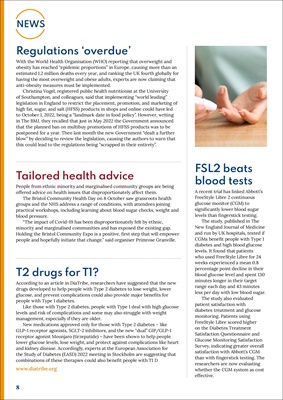
8
NEWS
Regulations 'overdue'
With the World Health Organisation (WHO) reporting that overweight and
obesity has reached "epidemic proportions" in Europe, causing more than an
estimated 1.2 million deaths every year, and ranking the UK fourth globally for
having the most overweight and obese adults, experts are now claiming that
anti-obesity measures must be implemented.
Christina Vogel, registered public health nutritionist at the University
of Southampton, and colleagues, said that implementing "world leading"
legislation in England to restrict the placement, promotion, and marketing of
high fat, sugar, and salt (HFSS) products in shops and online could have led
to October 1, 2022, being a "landmark date in food policy". However, writing
in The BMJ, they recalled that just in May 2022 the Government announced
that the planned ban on multibuy promotions of HFSS products was to be
postponed for a year. Then last month the new Government "dealt a further
blow" by deciding to review the legislation, causing the authors to warn that
this could lead to the regulations being "scrapped in their entirety".
Tailored health advice
People from ethnic minority and marginalised community groups are being
offered advice on health issues that disproportionately affect them.
The Bristol Community Health Day on 8 October saw grassroots health
groups and the NHS address a range of conditions, with attendees joining
practical workshops, including learning about blood sugar checks, weight and
blood pressure.
"The impact of Covid-19 has been disproportionately felt by ethnic,
minority and marginalised communities and has exposed the existing gap.
Holding the Bristol Community Expo is a positive, first step that will empower
people and hopefully initiate that change." said organiser Primrose Granville.
T2 drugs for T1?
According to an article in DiaTribe, researchers have suggested that the new
drugs developed to help people with Type 2 diabetes to lose weight, lower
glucose, and prevent complications could also provide major benefits for
people with Type 1 diabetes.
Like those with Type 2 diabetes, people with Type 1 deal with high glucose
levels and risk of complications and some may also struggle with weight
management, especially if they are older.
New medications approved only for those with Type 2 diabetes - like
GLP-1 receptor agonists, SGLT-2 inhibitors, and the new "dual" GIP/GLP-1
receptor agonist Mounjaro (tirzepatide) - have been shown to help people
lower glucose levels, lose weight, and protect against complications like heart
and kidney disease. Accordingly, experts at the European Association for
the Study of Diabetes (EASD) 2022 meeting in Stockholm are suggesting that
combinations of these therapies could also benefit people with T1 D
www.diatribe.org
FSL2 beats
blood tests
A recent trial has linked Abbott's
FreeStyle Libre 2 continuous
glucose monitor (CGM) to
significantly lower blood sugar
levels than fingerstick testing.
The study, published in The
New England Journal of Medicine
and run by UK hospitals, tested if
CGMs benefit people with Type 1
diabetes and high blood glucose
levels. It found that patients
who used FreeStyle Libre for 24
weeks experienced a mean 0.8
percentage point decline in their
blood glucose level and spent 130
minutes longer in their target
range each day and 43 minutes
less per day with low blood sugar.
The study also evaluated
patient satisfaction with
diabetes treatment and glucose
monitoring. Patients using
FreeStyle Libre scored higher
on the Diabetes Treatment
Satisfaction Questionnaire and
Glucose Monitoring Satisfaction
Survey, indicating greater overall
satisfaction with Abbott's CGM
than with fingerstick testing. The
researchers are now evaluating
whether the CGM system as cost
effective.